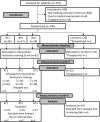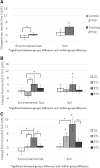Effects of a 9-month resistance training intervention on quality of life, sense of coherence, and depressive symptoms in older adults: randomized controlled trial
- PMID: 29124498
- PMCID: PMC5846971
- DOI: 10.1007/s11136-017-1733-z
Effects of a 9-month resistance training intervention on quality of life, sense of coherence, and depressive symptoms in older adults: randomized controlled trial
Abstract
Purpose: (1) To determine the effects of a 9-month resistance training intervention on quality of life, sense of coherence, and depressive symptoms in older adults, and (2) to compare effects between different training frequencies.
Methods: Men and women aged 65-75 (N = 106) were randomized to four groups according to training frequency: training groups RT1 (n = 26), RT2 (n = 27), and RT3 (n = 28) and non-training control group (n = 25). All training groups attended supervised resistance training twice a week for 3 months. For the following 6 months, they continued training with different frequencies (1, 2 or 3 times per week). Psychological functioning was measured by quality of life (WHOQOL-Bref), sense of coherence (Antonovsky's SOC-13), and depressive symptoms (Beck's Depression Inventory II). Measurements were conducted at baseline and 3 and 9 months after baseline. The effects of the intervention were analyzed using generalized estimating equations (GEE).
Results: After 3 months, there was an intervention effect on environmental quality of life (group × time p = .048). Between 3 and 9 months, environmental quality of life decreased among RT1 compared to RT2 and RT3 (group × time p = .025). Between baseline and 9 months, environmental quality of life increased in RT2 compared to all other groups (group × time p = .011). Sense of coherence increased in RT2 compared to the control group and RT3 (group × time p = .032).
Conclusion: Resistance training is beneficial for environmental quality of life and sense of coherence. Attending resistance training twice a week seems to be the most advantageous for these aspects of psychological functioning.
Keywords: Aging; Coping; Exercise; Mood; Quality of life; Well-being.
Conflict of interest statement
Conflict of interest
The authors declare that they have no conflict of interest.
Ethical approval
All procedures performed in studies involving human participants were in accordance with the ethical standards of the institutional and national research committee and with the 1964 Helsinki declaration and its later amendments or comparable ethical standards.
Informed consent
Informed consent was obtained from all individual participants included in the study.
Figures
References
-
- Skevington SM, Lotfy M, O’Connell KA, WHOQOL Group The World Health Organization’s WHOQOL-BREF quality of life assessment: Psychometric properties and results of the international field trial. A report from the WHOQOL group. Quality of Life Research. 2004;13(2):299–310. doi: 10.1023/B:QURE.0000018486.91360.00. - DOI - PubMed
Publication types
MeSH terms
Grants and funding
LinkOut - more resources
Full Text Sources
Other Literature Sources
Medical



